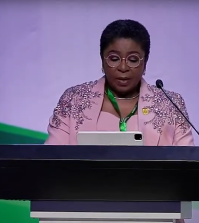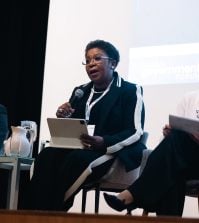Breaking down the barriers: attracting women to male-dominated roles and professions

Governments around the world should be working to attract women into fields and roles traditionally dominated by men – and to making sure their voices are heard when they get there. Zukiswa Mqolomba, deputy chairperson for the Public Service Commission of South Africa, argues that in order to achieve this, they must ask the right questions, change organisational culture and offer support and flexibility
It should go without saying that women are very much interested in roles and professions that have traditionally been occupied primarily by men – they are ready to take up space and to lead industries. But in order to drastically change the status quo and ensure they are able to do so, we need to be asking the right questions. And to my mind, the questions we should ask are, firstly, ‘How do we make male dominated professions women friendly?’ and secondly, ‘How do we retain women in these professions?’
For centuries, societies have dictated who and what women should become – but the time has come for women to define their own destinies and for that to happen they should be able to walk into any workplace without feeling inadequate and without feeling the need to work harder than their male counterparts to make the same impact.
Science, technology, engineering and maths (STEM) related fields have traditionally been, and remain, stubbornly resistant to gender diversity, yet application of these specialisms is becoming more and more important. In the government context, technology experts will be needed as administrations around the world grapple with digital transformation in order to improve public service delivery and streamline their own operations, while the need for sound scientific advice was only too apparent during the COVID-19 pandemic.
Read more: Australia’s defence department sets 50% recruitment target for women in STEM
The representation of women in such roles is vital if women and girls in populations at large are to feel that government policies and services work for them. But there seems to be a disconnect between women’s desire to go into such professions, and them actually doing it for the long term. For example, studies have shown that close to 40% of women who gain engineering degrees eventually decide to leave the profession (more on this in the box at the bottom of this article).
There are many barriers that deter women from establishing careers in a male-dominated fields and industries. The exclusion of women from male-oriented social circles, the common stereotyping of women as lacking certain skills, and women often being perceived first and foremost in terms of their appearance and sexuality are just a few of these.
Representation is not enough
I should emphasise that though more women are being appointed to traditionally male-dominated positions in some countries, we still have a long way to go: equality is not only about the representation of women in these positions but about those women being treated equally, appreciated and valued, as I argued in Global Government Forum’s interview with me for last year’s Women Leaders Index.
It is not enough to simply appoint women to certain positions: we need to see them as deserving of the positions and allow them to function at their best when they get there.
For this to happen, there needs to be a drastic change in organisational culture. Women must be given tasks that challenge them intellectually and they must be allowed to speak without being labelled as emotional or bossy. In addition, it is important that women are offered opportunities to test existing skill levels and to build confidence in their own abilities, and in doing so to create the kind of internal visibility necessary to advance their careers.
We need to cultivate work environments that allow women to be themselves and to realise their full potential. I am aware of many instances where men lack confidence, baselessly, in their female peers or superiors, leading women to doubt their own competence. And this can be worsened by gender-based micro-aggressions in the workplace, or exclusion from important professional networks, for example. Whatever the reasons, the doubts instilled in women prevent them from seeking out and seizing opportunities to advance their careers, making them less adept at self-promotion.
Support and flexibility
If women are reluctant to accept higher level work, due to care responsibilities at home, for example, line managers can provide the necessary encouragement, support and flexibility to enable them to progress. Managers can also help to create programmes and initiatives designed to actively motivate women to be confident in their abilities, and promote career-enhancing visibility and access to higher level networks.
Here, again, when talking about leadership positions, the numbers are not enough. If female voices are to equal male voices in the leadership ranks of government departments around the world, there is much more work to be done. While representation forms part of this discussion, rigorous institutional cultural change must be instilled so that we create safe and affirming spaces for women to lead. Men are automatically affirmed irrespective of whether or not they’re competent: we need to build a system in which women are given the opportunity to play their part in transforming government departments and services for citizens, and recognised for their contribution.
As women, we also bear responsibility for getting into male-dominated spaces; to stand our ground, to cement ourselves in the positions that we deserve and to strive to overcome every obstacle. We should demand our rightful places and work together to create spaces that allow us to reach our full potential.
Push for better representation of female engineers in Nigeria
The Association of Professional Women Engineers of Nigeria demanded last month that at least 30% of top managerial positions both in engineering firms and in related roles in government departments and agencies be filled by women.
Elizabeth Eterigho, the president of the association, said increasing representation of women in leadership roles in the scientific community would improve diversity and inclusion in key economic sectors, drive profitability, productivity and creativity, and reduce a skills shortage by encouraging more girls to take up engineering courses and careers.
“We carried out a study of a database of female engineers in managerial positions at engineering firms and ministries. We discovered that when a woman wants to be promoted to an administrative position in management, you would see more men sitting on the board [and there would be] flimsy excuses that the woman will want to take care of the children and other things,” she said.
To reach the 30% target, she said the government would need to allocate funding to enable women into male-dominated roles, and that it must “consciously put policies in place to help women generally not only for engineers but for other professions and make sure their voices are heard and not suppressed because we are all stakeholders in this country”.
A High Court ruling mandated the Nigerian federal government enforce the National Gender Policy in 2022. Designed to promote women’s participation in political, administrative and decision-making processes, under the policy, the government must allot 35% of related public sector appointments to women. According to Nigerian newspaper The Punch, at present women remain underrepresented at leadership levels in government.
Read more: Laws and policies must be biased towards improving lives of women, says South Africa’s president





















